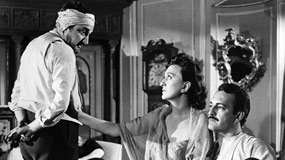

Luis Buñuel’s 1962 film The Exterminating Angel (El ángel exterminador) plays with the now-familiar theme of an individual or group’s struggle in an isolated environment. Buñuel’s genius is turning an upperclass dinner party into such a struggle.
A group of 20 arrives at Nobile’s house for a dinner engagement. Partway through their festivities, in a surreal turn, they discover that it is impossible for them to cross the threshold and exit the dining room. Unlike Jean-Paul Sartre’s No Exit (Huis clos, 1944), the bourgeoisie in the film are stuck in this place without reason or motivation.
Manners and etiquette unravel and break down; clothes and bodies become filthy; alliances and affairs begin; claustrophobia and madness take over in those who cannot handle this imprisonment. For Buñuel, this incarceration is an allegory for human life in geneal. “Freedom is no more than a ghost of mist,” he says. “Man can seek it out, even believe he has grasped it… and in the end, he is left with only fleeting bits of mist in his hands.”
We have paired this film with a more recent claustrophobic drama, Roman Polanski’s Carnage (2011), screening April 2, at Artspace at 8pm. In this feature, two bourgeois couples willingly trap themselves in a room because of their desire to be civilized and resolve an issue, like adults, between their young sons.
The two films complement each other in unique ways—whether Mexico in 1962 or the U.S.A. in 2011, the same social, cultural and ontological problems arise.
Please join us for a screening of Luis Buñuel’s The Exterminating Angel, Wednesday, March 26, at 8pm at Artspace (378 Aylmer St., between Hunter and Simcoe).
Prior to the film, at 6:30pm, we will screen a brand new horror film by Toronto director Garret Henry, entitled Dead Rivalry. For more info: www.facebook.com/trentfilmsociety; trentfilmsociety@gmail.com; http://www.gghmotionpictures.com/

